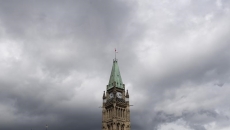VANCOUVER - The Vancouver Fraser Port Authority says cargo volumes increased one per cent to 146 million tonnes last year despite the pandemic, global supply chain challenges and extreme weather in B.C. at the end of the year.
The country's largest port says record container and foreign bulk volumes helped maintain cargo volumes despite trade challenges in a year in which the cruise season was cancelled due to COVID-19.
Grain volumes declined 13 per cent after eight straight record years due to drought in Western Canada in the second half of the year.
The number of shipping containers passing through the port increased six per cent to 3.7 million TEUs (twenty-foot equivalent units) in 2021, a record for the fifth year in a row.
Amid the increase in container trade were an elevated number of empty containers, putting pressure on Canadian exporters as containers were rushed back to Asia to accommodate strong consumer demand in North America.
The port is warning that serious supply-chain problems will occur in a few years because west coast container terminals are expected to run out of capacity by the end of the decade.
“Vancouver’s port community met challenge after challenge in 2021 — sometimes working around the clock — to keep the port connected to national supply chains and goods flowing for Canadians,” stated Robin Silvester, president and CEO of the Vancouver Fraser Port Authority, the federal agency in charge of the Port of Vancouver.
General cargo increased 18 per cent with log volumes up 23 per cent, basic metals up 51 per cent and wood pulp down 10 per cent.
Bulk dry cargo increased one per cent with coal up 19 per cent, grain down 10 per cent, potash down 13 per cent and sulphur down 14 per cent. Bulk liquid tonnage fell 8 per cent due to a 30 per cent decrease in canola oil, a 12 per cent decrease in crude petroleum, and a 14 per cent decrease in chemicals.






